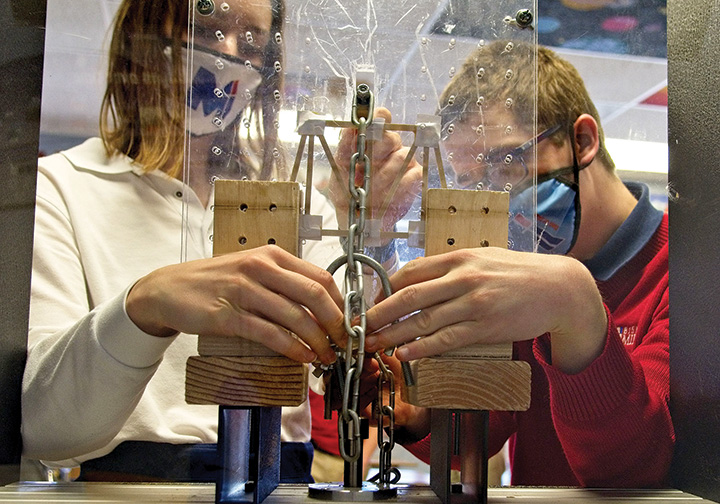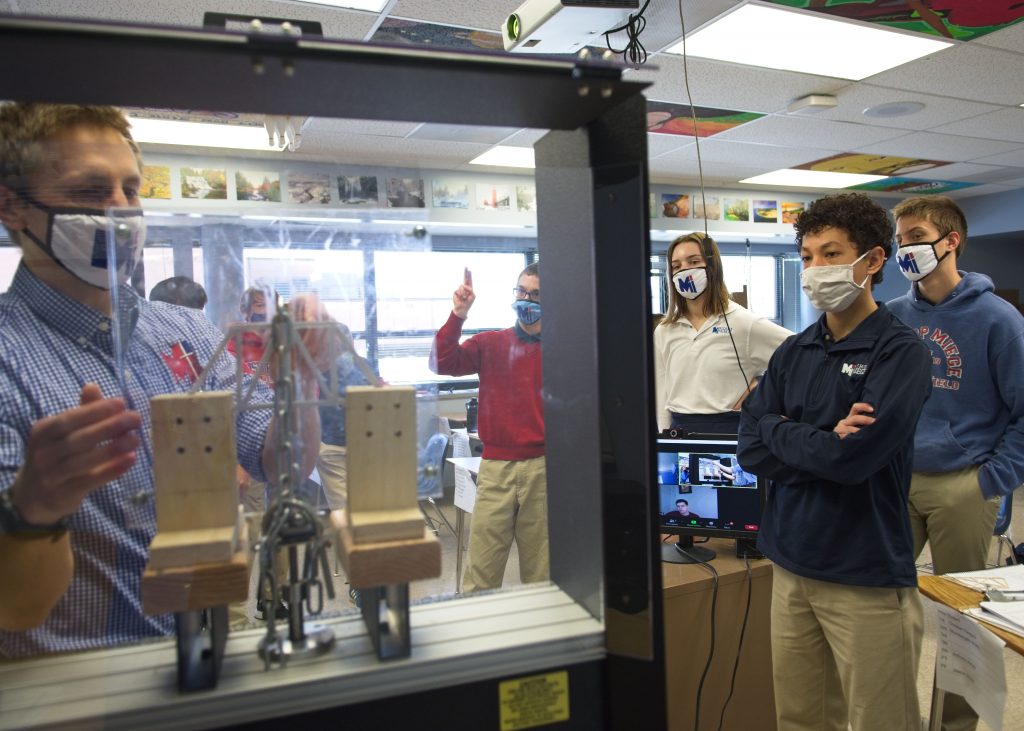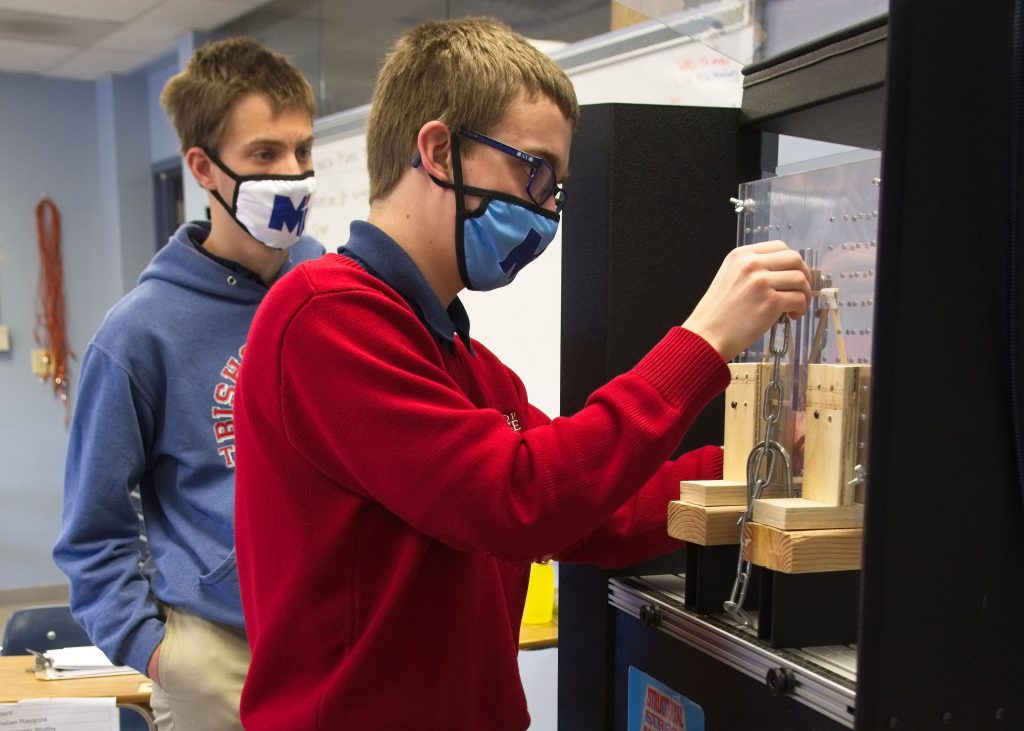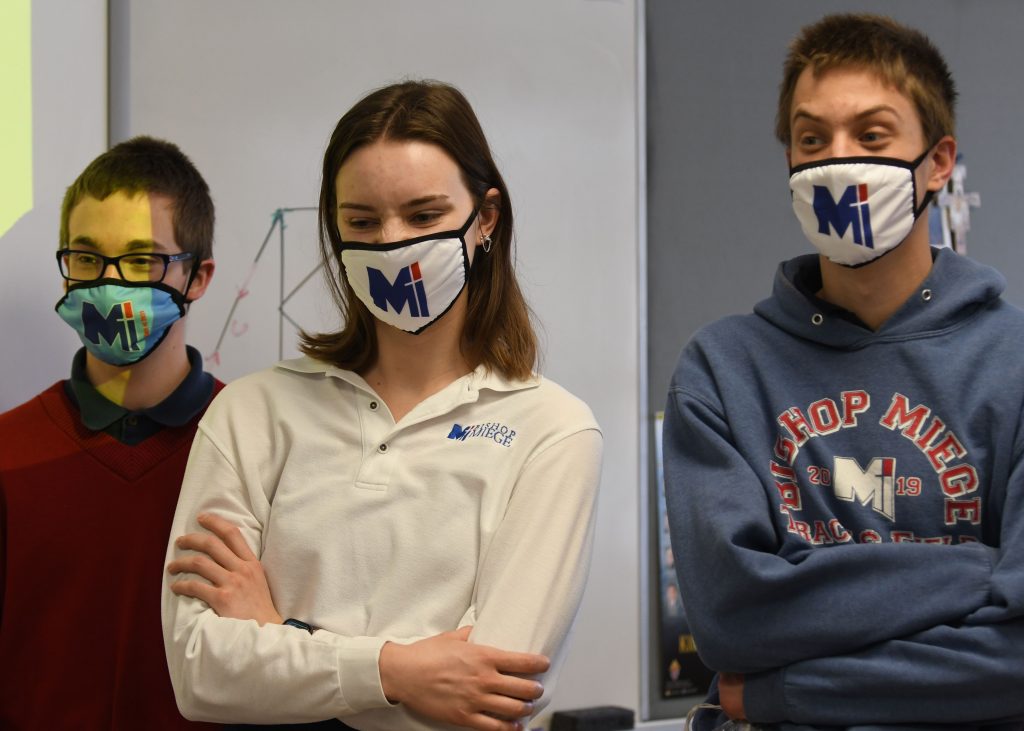
by Jill Ragar Esfeld
jill.esfeld@theleaven.org
ROELAND PARK — Bishop Miege senior Aidan Oblepias believes being a part of the innovative engineering and computer science program Project Lead the Way (PLTW) is the most meaningful part of his high school experience.
“I think without it,” he said, “I really would have no idea where I would be going to college.
“Since I’ve been able to experience those real-world applications of problems [through PLTW], I kind of have a direction where I want to take my education.”
Oblepias is not the only student to feel this way. Since the PLTW curriculum was introduced in 2016, the outcomes have been outstanding.
This year, six PLTW students are National Merit Scholars, including four Finalists.
Two of the six also received perfect scores on the ACT.

The curriculum of PLTW is part of the high school’s STREAM (Science, Technology, Religion, Engineering, Arts and Math) initiative. It offers college-credit eligible classes in engineering and computer science.
The courses prepare students for top engineering and computer science careers.
According to STREAM coordinator Joan Gladbach, the “secret” of the program’s positive outcomes is project- based learning.
“Students need to be able to think on their feet,” she said. “You see kids think differently when they take these courses.
“They’re better prepared for life.”
Bishop Miege principal Maureen Engen has seen that think-on-your-feet behavior when she visits the classrooms
“With traditional education,” she said, “the questions educators typically get are: ‘What’s on the quiz? What’s on the test? How much is it going to be worth? Does spelling count?
“I’ve never once walked into a PLTW class where students weren’t talking about something on the computer or actually working together and building something.”
“It teaches the skills people are really going to need when they go into the workforce,” she continued, “being a team player, being a team partner and knowing how to participate in a real collaborative effort and take your own part and be courageous enough to give your own opinion.”

Courses allow students to experience science and technology in a way that informs them about what pursuits may suit them best in college.
“I studied engineering in college,” said engineering department chair J.C. Clark, “with very little understanding of what it involved other than it was kind of hard and involved a lot of math and science. And that’s about it.
“Here, students can build skills that I didn’t see until college — exposure to different disciplines in engineering, different technology pieces like using computer and design CAD software or the industry standard for architectural design or doing structural analysis on a truss for a bridge.”
“That’s what’s cool about the program,” he added. “It’s student-driven and student-directed, collaborative, project-based, hands-on, and applies authentic, real skills that they would need as engineers.”
“They go into college with a real clear vision that this is something I’m passionate about and want to do,” Clark concluded.

Along with giving students a clear vision of what they might want to study in college, project-based learning gives them a leg up on the standardized test that will help them enter the college of their choice.
“It requires students to do a lot of trial-and-error to figure out what will work and what won’t work,” said Gladbach. “We don’t give them the answers; they have to figure out the answers.
“That creative learning forces students out of the memorization and regurgitation cycle that we sometimes get into as educators, and pushes them into a realm of figuring it out as they go.
“The PSATs are geared toward figuring it out as you go — they don’t require you to have something memorized.”
With the success of PLTW, Bishop Miege is committed to incorporating the philosophy of project-based learning into every discipline so all students can reap the benefits of problem-solving through creative thinking.
“We’re trying to make sure students see the responsibility of the skills they’re being taught beyond their high-school classrooms,” said Clark, “so they can become good citizens of our country and disciples of Jesus.
“There are a million problems out there. Which problems are you going to solve? And how are you going to serve the church by doing that?”
What is STREAM education?
STREAM learning includes the traditional STEM disciplines: Science, Technology, Engineering and Math. At Bishop Miege High School in Roeland Park, it includes “R” for Religion and “A” for the Arts. STREAM education utilizes an interdisciplinary approach to learning that gives students the opportunity to learn in a hands-on environment while addressing relevant real-world problems. It engages students and equips them with critical thinking, problem-solving, creative and collaborative skills that will provide a foundation for success in college and career. This type of learning applies to a wide variety of jobs and professions.
For more information, visit the website at: bishopmiege.com and choose STREAM from the ACADEMICS drop-down menu.






